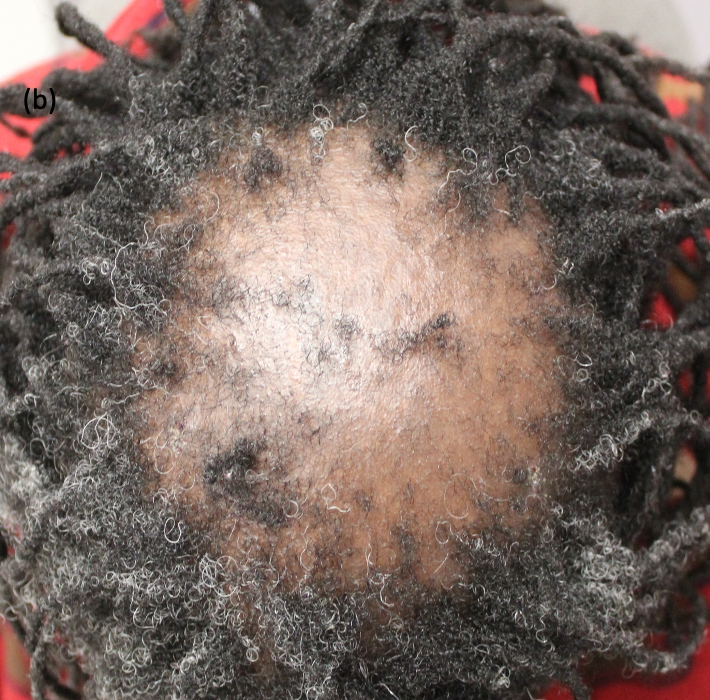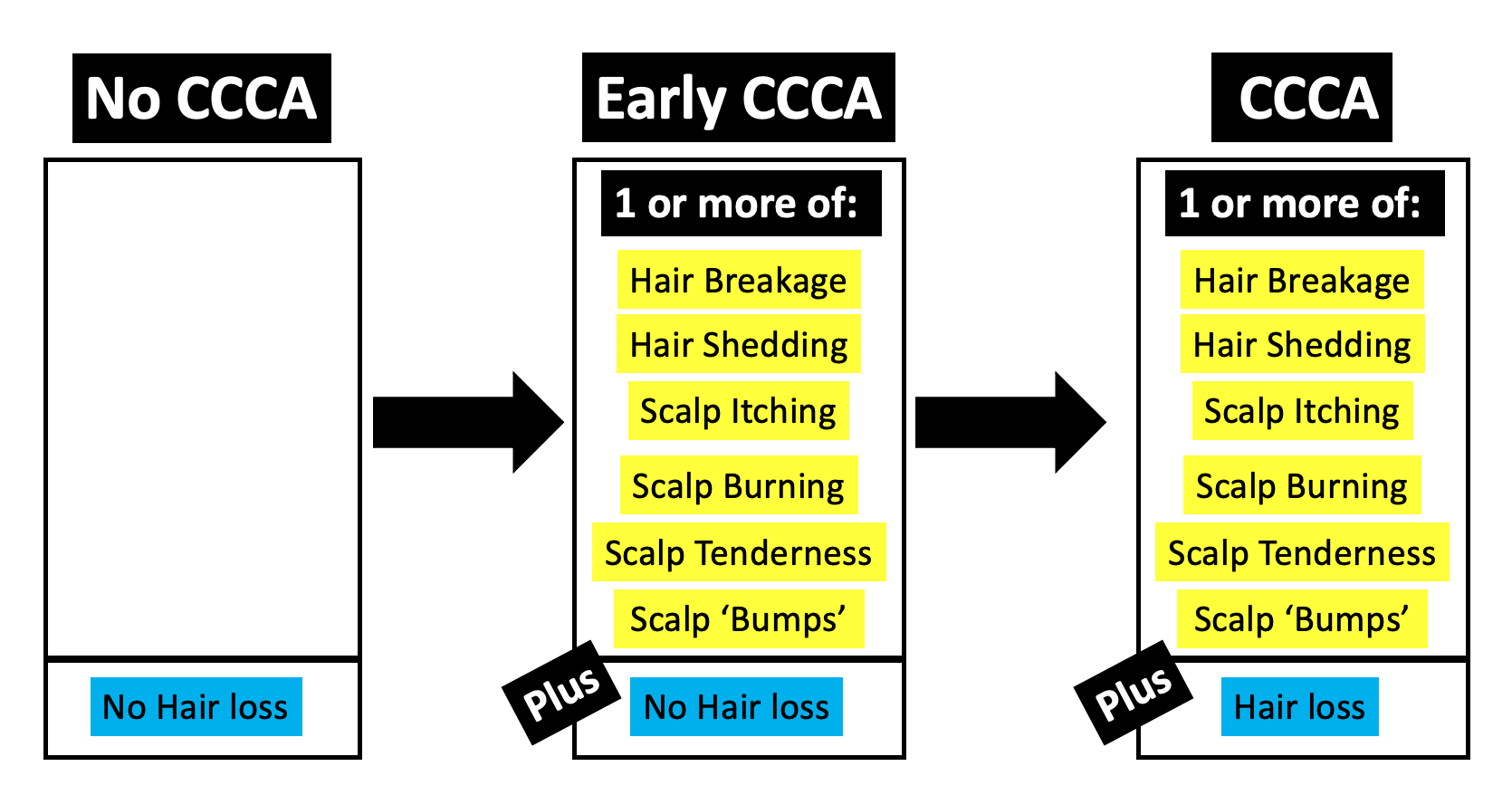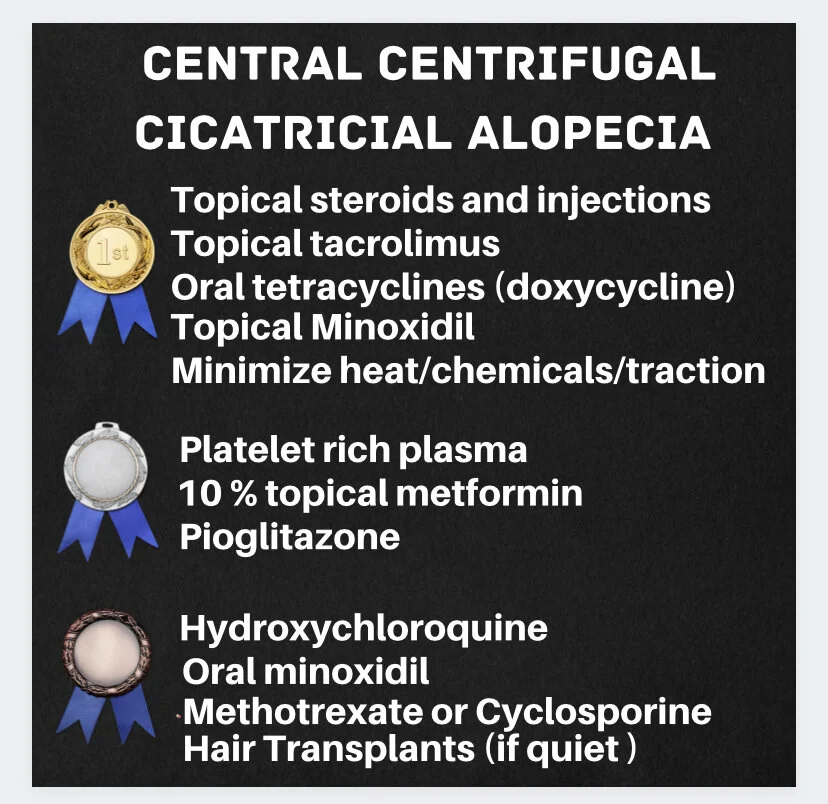Central Centrifugal Cicatricial Alopecia (CCCA): Diagnosis and Treatment
What is CCCA and what are the options for treating CCCA?
What is Central centrifugal cicatricial alopecia or “CCCA”?
CCCA is a type of scarring hair loss condition that predominantly affects black women. CCCA typically develops in the mid to late 30s. It can develop at earlier ages, but that is not common.
Affected women may be asymptomatic or notice itching or burning or tenderness in the central region of the scalp (crown). Some women also develop hair breakage.
Hair loss slowly spreads outwards from that area over time leading to permanent hair loss.
Early stage CCCA; The goal of treatment is to not only stop the area from expanding but also to try to stimulate hair regrowth (at least to some degree). The goal is also to ensure the patient has no scalp symptoms (like itching burning tenderness). Regrowth is much more likely in early CCCA than late stage CCCA.
Advanced stage CCCA; The goal of treatment is to stop the area from expanding and to ensure the patient has no scalp symptoms (like itching burning tenderness). Regrowth may or may not occur and if it does it is likely minimal.
Early CCCA: The importance of Hair Breakage.
The diagnosis of CCCA in the early stages can be challenging. However, if one is very aware that “hair breakage" is often a concern among women with early stage CCCA the diagnosis can often be picked up early. I have a reviewed this in prior articles:
Hair Breakage in Black Women: Not to Be Overlooked
Many women with CCCA note that some areas on the scalp just don’t grow long and these may be areas that measure anywhere from the size of a golf ball to the the size of a tennis ball to the size for a grapefruit. The areas are typically located in the central scalp.
In addition, many women with CCCA have scalp symptom like itching, burning and tenderness.
What is the cause of CCCA?
The cause is not fully known. Some women may inherit genes from birth (such as PADI3) that increase their chances to develop CCCA in the future. Some genes that affected women inherit may predispose not only to CCCA but also to uterine fibroids. So there is complex role in many factors including how hairs fold and how patients are predisposed to scarring that goes into the ultimate development of CCCA.
It has also been hypothesized that use of braids, weaves, cornrows and relaxers, especially at younger ages may contribute in some way to the development of this conditions. This is not thought to be a cause but rather a contributor.
How is CCCA evaluated?
The diagnosis is primarily made clinically – by performing a proper scalp examination and by trichoscopy (use of a hand held trichoscope). A biopsy may be obtained when the diagnosis is not clear but that is not always necessary.
Blood tests are needed for every single patient with CCCA. The exact tests to order depend a bit on the patient’s exact story but I typically consider CBC, TSH, ferritin, 25 hydroxyvitamin D, hemoglobin A1c, fasting glucose, and ESR.
If pustules are present on the scalp, the pustules should be cultured.
What are the best treatments for CCCA?
Before we discuss treatment, it’s important to be aware that the goals of treatment are different for different stages of hair loss. In very early CCCA, the goal might be to stop hair loss and actually try to grow back some hair. In late stage CCCA, the goal is to simply stop further hair loss. Permanently scarred areas might not be possible to regenerate.
There are many treatments for CCCA. In fact, when you add them up there are probably about 15 treatments that have been described. They are not all equal. Some seem relatively ineffective for the most part including immunosuppressives like hydroxychloroquine, methotrexate, cyclosporine and mycophenolate. Others seem quite effective including steroid injections, doxycycline and topical steroids and tacrolimus.
First line (or “best evidence”) treatments for CCCA include topical steroids, topical tacroliumus, steroid injections and oral medications such as doxycycline. Topical minoxidil may be helpful to promote hair growth once inflammation has been reduced. Second line agents are less well researched but inlcude topical metformin, PRP and pioglitazone. Hair transplants may be possible if the disease has been completely inactive for at least 2 years. Treatments are summarized below:
This article was written by Dr. Jeff Donovan, a Canadian and US board certified dermatologist specializing exclusively in hair loss.




